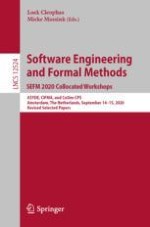2021 | OriginalPaper | Chapter
Personal Identity and False Memories
Author : Danil Razeev
Published in: Software Engineering and Formal Methods. SEFM 2020 Collocated Workshops
Publisher: Springer International Publishing
Activate our intelligent search to find suitable subject content or patents.
Select sections of text to find matching patents with Artificial Intelligence. powered by
Select sections of text to find additional relevant content using AI-assisted search. powered by
